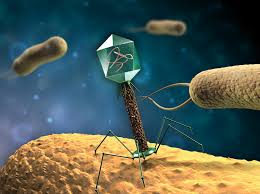
KEMRI partners with Ohio University to improve Food Security and Nutrition in Kenya.
March 21, 2022
KEMRI partners with WHO to manage COVID-19 in Africa
April 1, 2022BACTERIOPHAGES (PHAGES) TO COMPLEMENT EFFORTS TO TACKLE ANTIMICROBIAL RESISTANCE

KEMRI will lead the development of bacteriophage solutions to combat Anti-Microbial Resistance (AMR) infections and control for bacterial contamination of food and the environment. Towards this end, KEMRI will hence deploy its resources such as the state-of-the-art biorepository, laboratories and genomic capacity, clinical and scientific expertise to make this possible. The acting Director General, Prof. Sam Kariuki, said in his speech, read on his behalf by Dr. Lilian Musila, during the first ever Kenyan Symposium on Bacteriophages (Phages) held on Monday 21st March 2022 co-hosted KEMRI and the Institute of Primate Research (IPR).
The symposium brought together both local and international researchers with an aim to define a path to make phage application a reality for Kenyans, farmers and the food industry in the wake AMR. The different presentations and discussions centered on the progress of phage research in the country. AMR is the biggest public health facing humanity, with estimates of 50 million deaths by 2050 annually.
In 2019, AMR caused 27 deaths in every 100,000 in Sub Saharan Africa, accounting for more deaths than HIV and malaria combined. In its 2020 antibiotic pipeline report, the World Health Organization (WHO) indicated a shortage of innovative antibiotics in development to address the gaps created by AMR, especially against bacteria that cause life-threatening respiratory and blood infections.


The Phages, tiny virus-like organisms, are hailed as the next breakthrough in the fight against AMR. Phages invade bacteria, replicate inside them and then kill the bacteria. Unlike antibiotics, each phage type targets a specific bacterial species, they do not destroy the “good” bacteria present in the body.
“KEMRI, as the leading institution for Health research in Kenya, is committed to providing novel and innovative solutions to health problems. KEMRI will deploy its resources such as the state of the art biorepository, laboratories and genomic capacity, clinical and scientific expertise to make this possible.” She added.
The delegates, agreed that there is need to increase multisector collaborations between local and international researchers and Institutions, create working groups to explore and apply for grants in phage research and build a virtual phage repository. The participants agreed that there is a need to engage regulatory bodies and create a legal framework for phage research in Kenya.


